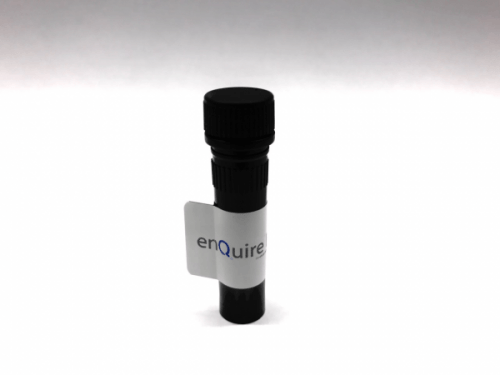Human Serine protease HTRA1 Recombinant Protein Product Attributes
Product Type: Recombinant Protein
Recombinant Serine protease HTRA1 based upon sequence from: Human
Host: QP7864 protein expressed in E. coli.
Tag: His-SUMO
Protein Construction: A DNA sequence encoding the Homo sapiens (Human) Serine protease HTRA1, was expressed in the hosts and tags indicated. Please select your host/tag option, above.
Application Notes: Please contact us for application specific information for QP7864.
Bioactivity Data: Untested
Full Length? Full Length
Expression Region: Gln23 – Pro480
Amino Acid Sequence: QLSRAGRSAP LAAGCPDRCE PARCPPQPEH CEGGRARDAC GCCEVCGAPE GAACGLQEGP CGEGLQCVVP FGVPASATVR RRAQAGLCVC ASSEPVCGSD ANTYANLCQL RAASRRSERL HRPPVIVLQR GACGQGQEDP NSLRHKYNFI ADVVEKIAPA VVHIELFRKL PFSKREVPVA SGSGFIVSED GLIVTNAHVV TNKHRVKVEL KNGATYEAKI KDVDEKADIA LIKIDHQGKL PVLLLGRSSE LRPGEFVVAI GSPFSLQNTV TTGIVSTTQR GGKELGLRNS DMDYIQTDAI INYGNSGGPL VNLDGEVIGI NTLKVTAGIS FAIPSDKIKK FLTESHDRQA KGKAITKKKY IGIRMMSLTS SKAKELKDRH RDFPDVISGA YIIEVIPDTP AEAGGLKEND VIISINGQSV VSANDVSDVI KRESTLNMVV RRGNEDIMIT VIPEEIDP
Purity: Greater than 90% as determined by SDS-PAGE.
Reconstitution Instructions:
Concentration of Human Serine protease HTRA1 Protein:
Endotoxin Levels: Not determined.
Buffer: Tris-based buffer, 50% glycerol
Storage Conditions: Store at -20C to -80C.
| Recombinant Human Serine protease HTRA1 Protein General Information | |
|---|---|
| Alternate Names | |
| ORF480; HtrA; CARASIL; ARMD7; PRSS11; CADASIL2; L56 | |
| Curated Database and Bioinformatic Data | |
| Gene Symbol | HTRA1 |
| Entrez Gene ID | 5654 |
| Ensemble Gene ID | ENSG00000166033 |
| RefSeq Protein Accession(s) | NP_002766.1 |
| RefSeq mRNA Accession(s) | NM_002775.4 |
| UniProt ID(s) | Q92743 |
| UniGene ID(s) | Hs.501280 |
| HGNC ID(s) | HGNC:9476 |
| KEGG Gene ID(s) | hsa:5654 |
| PharmGKB ID(s) | PA33829 |
| General Description of Recombinant Human Serine protease HTRA1 Protein. | |
| Serine protease with a variety of targets, including Extracellular domain matrix proteins such as fibronectin. HTRA1-generated fibronectin fragments further induce synovial cells to up-regulate MMP1 and MMP3 production. May also degrade proteoglycans, such as aggrecan, decorin and fibromodulin. Through cleavage of proteoglycans, may release soluble FGF-glycosaminoglycan complexes that promote the range and intensity of FGF signals in the Extracellular domain space. Regulates the availability of insulin-like growth factors (IGFs) by cleaving IGF-binding proteins. Inhibits signaling mediated by TGF-beta family members. This activity requires the integrity of the catalytic site, although it is unclear whether TGF-beta proteins are themselves degraded. By acting on TGF-beta signaling, may regulate many physiological processes, including retinal angiogenesis and neuronal survival and maturation during development. Intracellularly, degrades TSC2, leading to the activation of TSC2 downstream targets. | |
Limitations and Performance Guarantee
This is a life science research product (for Research Use Only). This product is guaranteed to work for a period of two years when stored at -70C or colder, and one year when aliquoted and stored at -20C.




There are no reviews yet.